Centre for Trials Research At #ICTMC2024: 7th International Clinical Trials Methodology Conference (ICTMC)
26 November 2024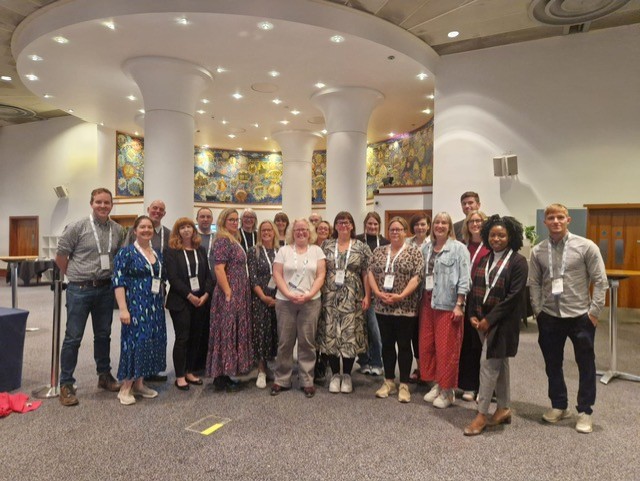
– Helen Stanton, Waku Maboshe and Fiona Lugg-Widger
This year, the bi-annual International Clinical Trials Methodology Conference (ICTMC) was held in the beautiful and historic city of Edinburgh, Scotland. Held at Edinburgh’s International Conference Centre, proceedings took place from the 30th of September to the 3rd of October 2024. The program included presentations and posters, bookended by educational workshops on Monday morning and afternoon and Thursday afternoon. This structure allowed attendees to engage deeply with educational content before and after the main conference events.
The ICTMC meeting is an ideal space for sharing much in the way of clinical trials methodologies and offers a valuable opportunity for in-person networking and collaboration, which feels like a novelty these days!
This year’s event welcomed 1,300 delegates (an increase of 400 since ICTMC 2022!). If seemingly large conferences are not your thing, please don’t let the number of attendees put you off. Whether a student or a seasoned triallist, ICTMC provides an ideal opportunity to connect with colleagues, team members and potential collaborators over a poster or two. Although this is not to underestimate the platform for dissemination the conference provides; this is an occasion to survey the progress and innovation of clinical trial research and get to understand the systems by which these advancements have come about.
The Centre for Trials Research (CTR) delegation was 22 people strong this year, comprising divisional and study leads, statisticians, routine data researchers, qualitative researchers, research nurses, trial managers, and data managers. Oral presentations by CTR attendees were popular and exceptionally well received. Similarly, poster presentations attracted a great deal of interest, with fellow attendees stopping to chat with colleagues about their work.
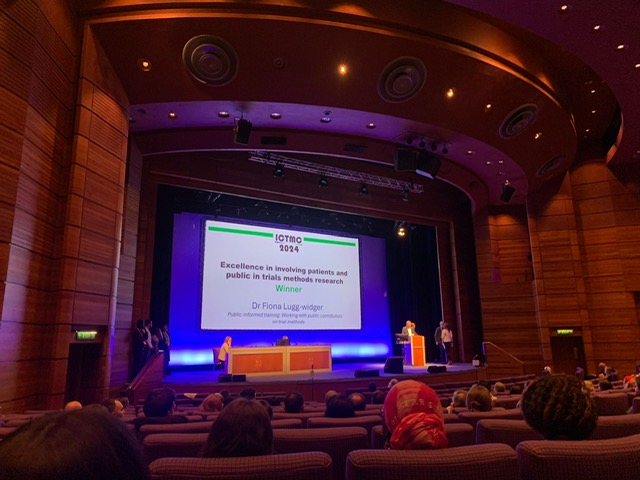
A special shout-out goes to Fiona Lugg Widger, who won the “Excellence in Involving Patients and Public in Trials Methods Research” prize for her incredibly well-received presentation with research partner, Mike Molete, on public-informed research training. This recognition highlights the impactful work being done in making research more inclusive and community-centric.
Of course, not to be forgotten, Rob Trubey’s educational workshop was very well attended, necessitating additional chairs being brought in! Further descriptions of CTR contributions to the conference are included below.
Daily plenary sessions at the event provided a fantastic opportunity to hear world-leading experts share their experiences and expertise on the design and conduct of clinical trials:
Prof. Linda Collins opened the conference on Tuesday morning with her keynote, titled “Achieving intervention EASE with the multiphase optimization strategy (MOST)”, in which she introduced an alternative paradigm for developing, optimizing, and evaluating behavioural and bio-behavioural interventions.
Wednesday afternoon Professor Deborah Ashby gave the Prof. Doug Altman Memorial Lecture on “Bayesian Approaches to Randomised Trials: Celebrating the Past 30 Years, Looking Forward to the Future”.
Prof Kamlesh Khunti delivered Thursday’s keynote on “Ethnic minority representation in clinical trials”. His session brought together the clinical importance of inclusivity in trials as well as the wider societal importance, and the resources we can utilise to help us do better including enhancing quality in data. His publication he referred to in his presentation was published the next day (https://doi.org/10.5281/zenodo.13890529).
Further education and training opportunities were offered through pre- and post-conference workshops hosted by expert delegates. These included sessions on a diverse range of topics around trial methodology and conduct. A special mention to CTR’s Rob Trubey who led a very well-attended workshop titled “Can Healthcare Systems Data be relied upon for measuring clinical trial outcomes? An updated perspective”.
Conference Highlights
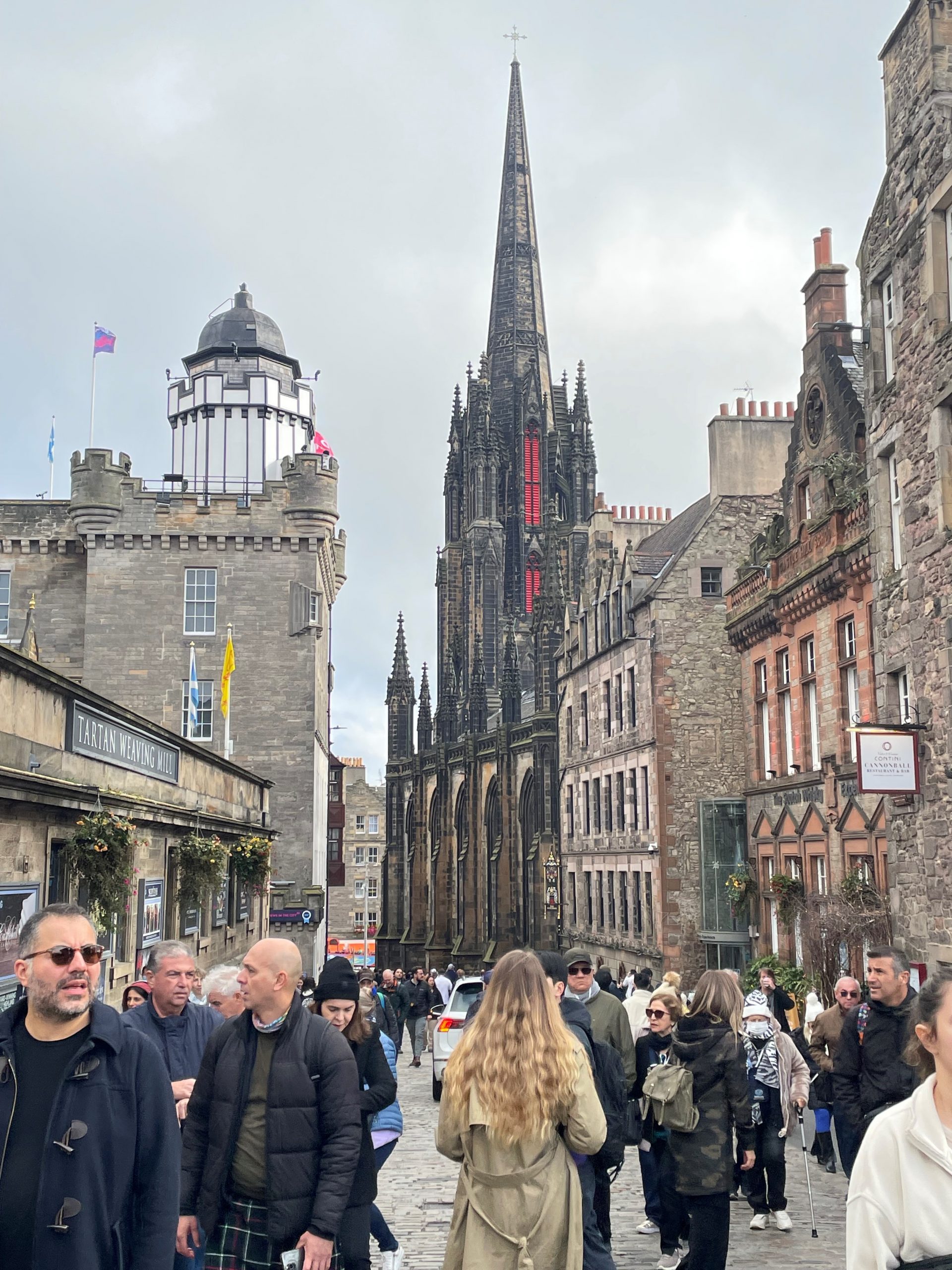
Exploring Edinburgh: A City Steeped in History and Modernity
Edinburgh is a beautiful city to explore on foot, offering a vibrant mix of historic charm with its iconic sandstone buildings and modern attractions, including a dynamic cultural scene and gastronomy. Some attendees arrived early and made the most of their downtime by visiting the botanical gardens, exploring Edinburgh Castle, and sampling cuisine from its burgeoning food scene.
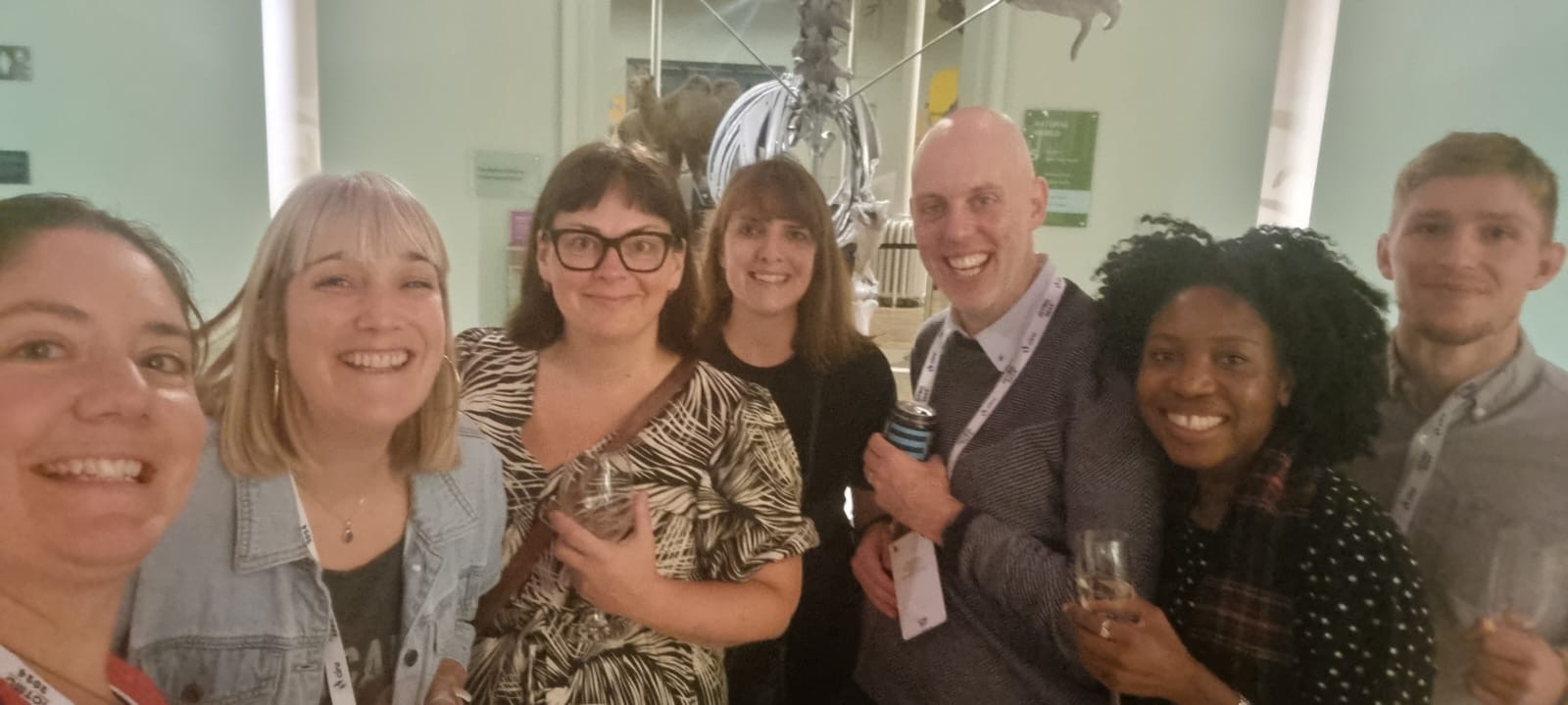
A Night at the Museum
The Victorian architecture of the National Museum of Scotland provided a spectacular backdrop for the conference party. Held within the grand gallery, delegates were welcomed by a bagpiper and enjoyed fantastic entertainment, featuring a lively ceilidh and an electric live band playing party tunes. The event also offered the chance to visit exhibitions and savour delicious, ethically sourced Scottish produce, including haggis with a vegan option.
Impact on Our Day-to-Day Work
The conference played a crucial role in enhancing our everyday work by increasing confidence with the latest methodological developments and trends. Being at the conference allowed us to converse and learn firsthand from those actively engaged in this work, gaining insights from their experiences with the triumphs and setbacks of new methodologies. This direct interaction is a key benefit, enabling us to confidently incorporate new advances into our practices and improve the quality and impact of our research.
Cultural Shift in Research Conduct and Methodology
It’s inspiring to see how far public involvement in trials has progressed since the late 2010s. This cultural shift is now well-established, evident in the numerous posters and presentations employing these methods as well as the large number of public members attending and contributing throughout the conference. The focus on underserved populations and maximising inclusivity in co-designing and participating in research, such as Vicky Shepherd’s work, further underscores this transformation (see more on Vicky’s session in the oral presentations section below).
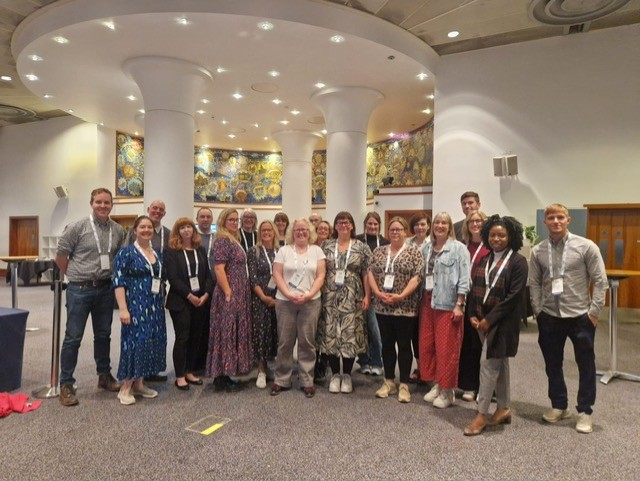
Oral presentations
There was strong representation from CTR at the parallel presentation sessions. The diverse range of talks on offer left attendees spoilt for choice. There truly was something to suit everyone’s areas of interest. Below is a brief description of the talks presented by CTR researchers:
In a change to the traditional conference presentation format, Martina Svobodova was invited on Tuesday morning to give a lightning talk on “Patient and Public Involvement in the Design and Protocol Development for a Platform Randomised Trial to Evaluate Diagnostic Tests to Optimise Antimicrobial Therapy”. This short-form talk was about co-production in the development of the PROTECT trial.
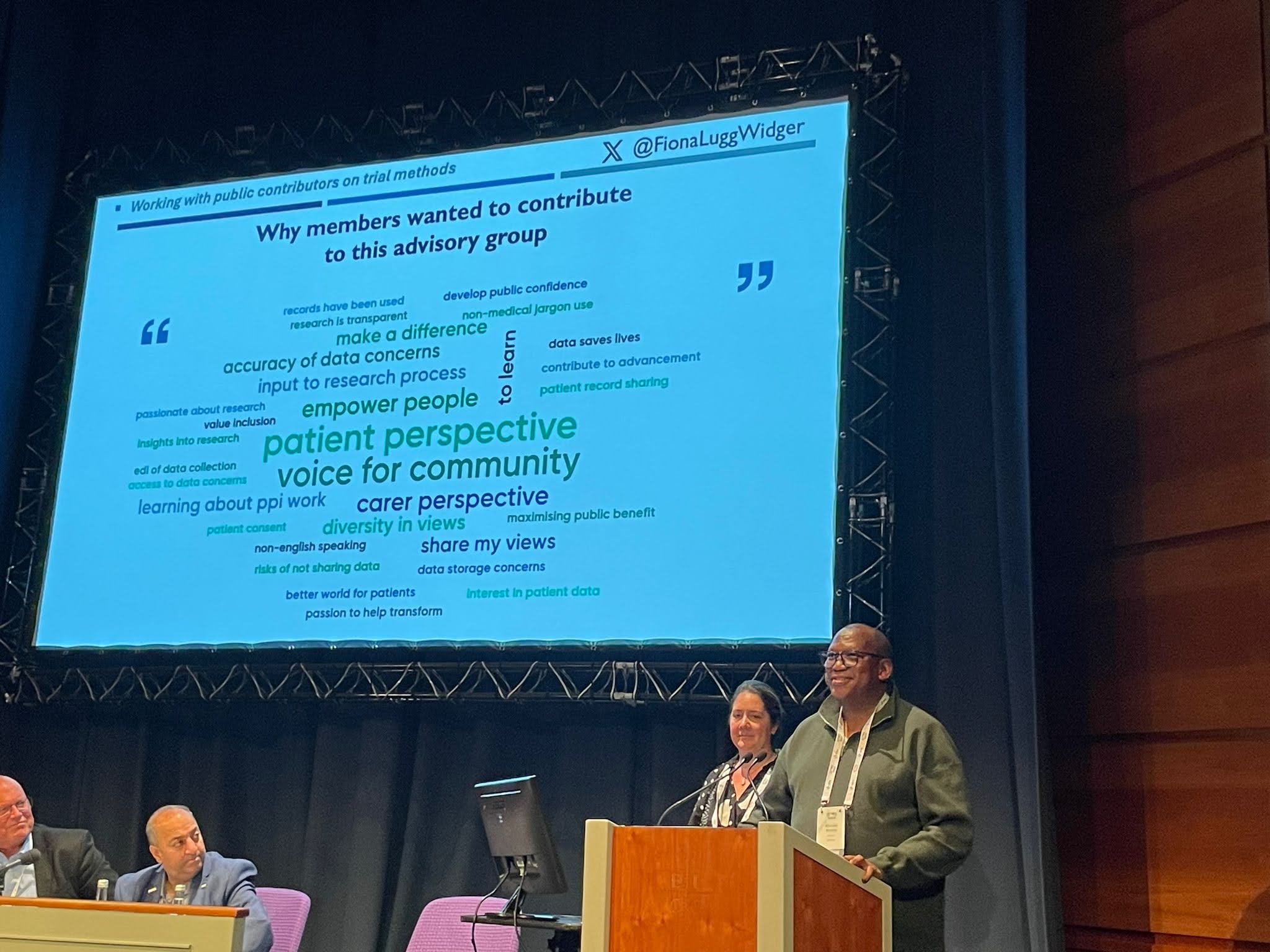
That afternoon saw Mike Molete from the Transforming Data For Trials Public Advisory Group, and Fiona Lugg-Widger co-presenting “Public-informed training: Working with public contributors on trial methods”. The content and delivery of this presentation were a fantastic demonstration of public involvement in trial methods co-production.
Vicky Shepherd opened Wednesday morning’s SWAT parallel session with her presentation on the “Feasibility of conducting a ‘Study Within a Trial’ of a recruitment intervention for trials involving adults with impaired capacity to consent (CONSULT SWAT)”. The talk aimed to discuss the achievability of conducting a SWAT within CONSULT; a project designed to evaluate a decision-support intervention to help consultees and legal representatives of adults lacking the capacity to consent to take part in research.
Lawrence Raisanen delivered “Auto-coding MedDRA: Comparing NLP Fuzzy Matching and Manual Encoding of Free-text Adverse Events in a Cancer Trial” in the afternoon’s ‘parallel session on ‘Electronic health records and machine learning’. Lawrence discussed how auto-coding free-text safety data can offer a faster, less resource-heavy alternative to manual free-text coding methods.
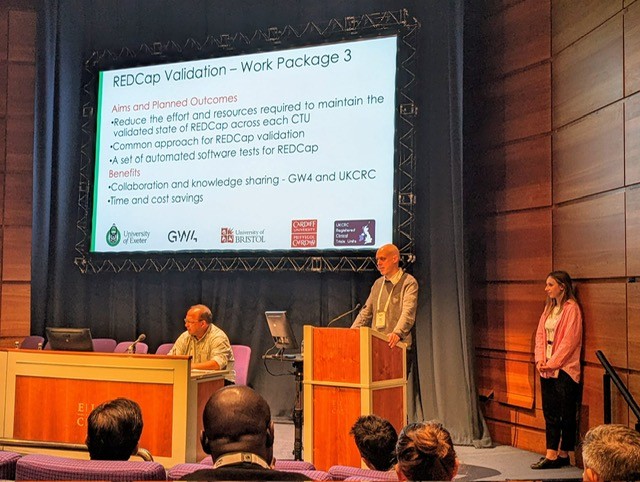
In the Wednesday afternoon parallel session on ‘Information Systems and technology’ Nigel Kirby and Phoebe Dawe from the University of Exeter co-presented “Consolidating Data Management and IS Knowledge”. This talk was about the GW4 collaboration, a cross-institutional collaboration which examines how CTR and other clinical trial units ‘do’ data management.
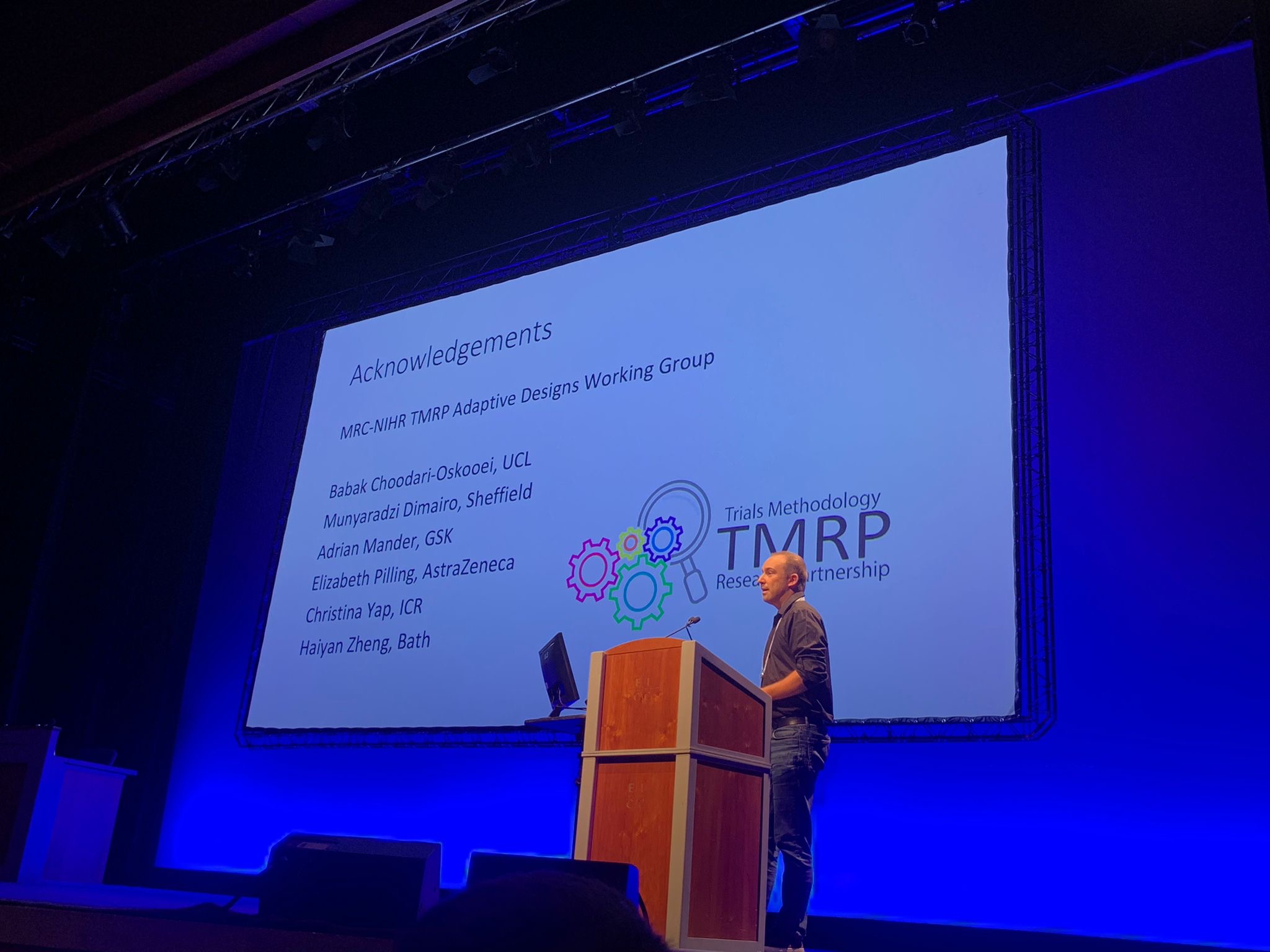
Phil Pallman’s presentation “A case for interim estimands in adaptive trials” on Thursday morning focused on statistical methodology in adaptive trial designs. Phil’s key message was that analysis objectives using the estimands framework in adaptive design trials should be applied to interim analyses, not just the final analyses.
![Kerry Hood presenting at ICTMC 2024]](http://blogs.cardiff.ac.uk/centre-for-trials-research/wp-content/uploads/sites/499/2024/11/Kerry-scaled.jpg)
Not forgetting Kerry Hood’s session on “Ethical issues and the clinical trials biostatistician” which led to a very interesting discussion and personal examples from the audience on their experiences of such ethical issues in the design and planned analysis of trials.
Poster Presentations
Breaks between plenary and parallel sessions allowed attendees to peruse hundreds of skilfully displayed posters. CTR researchers did a fine job of presenting their work in poster format. Their exhibits are described below:
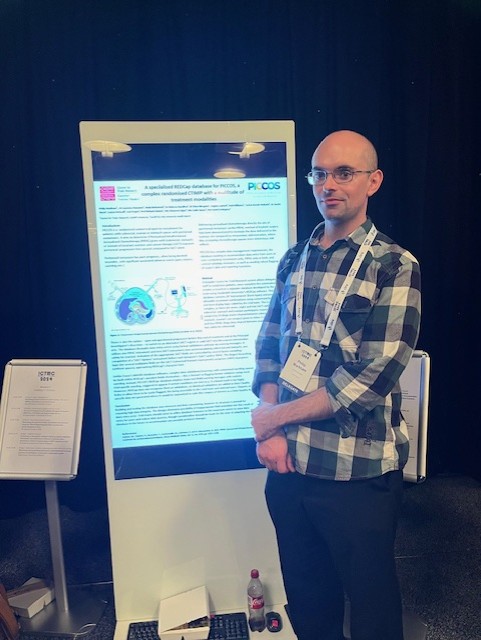
Phil Markham presented three posters titled:
“The impact and reconciliation of a change in TNM staging classification edition during the Phase III SCOPE2 clinical trial”
“Utilising repeating (‘cloned’) forms to minimise workload required when building, editing or testing clinical trial databases”
“A specialised REDCap database for PICCOS, a complex randomised CTIMP with a multitude of treatment modalities”
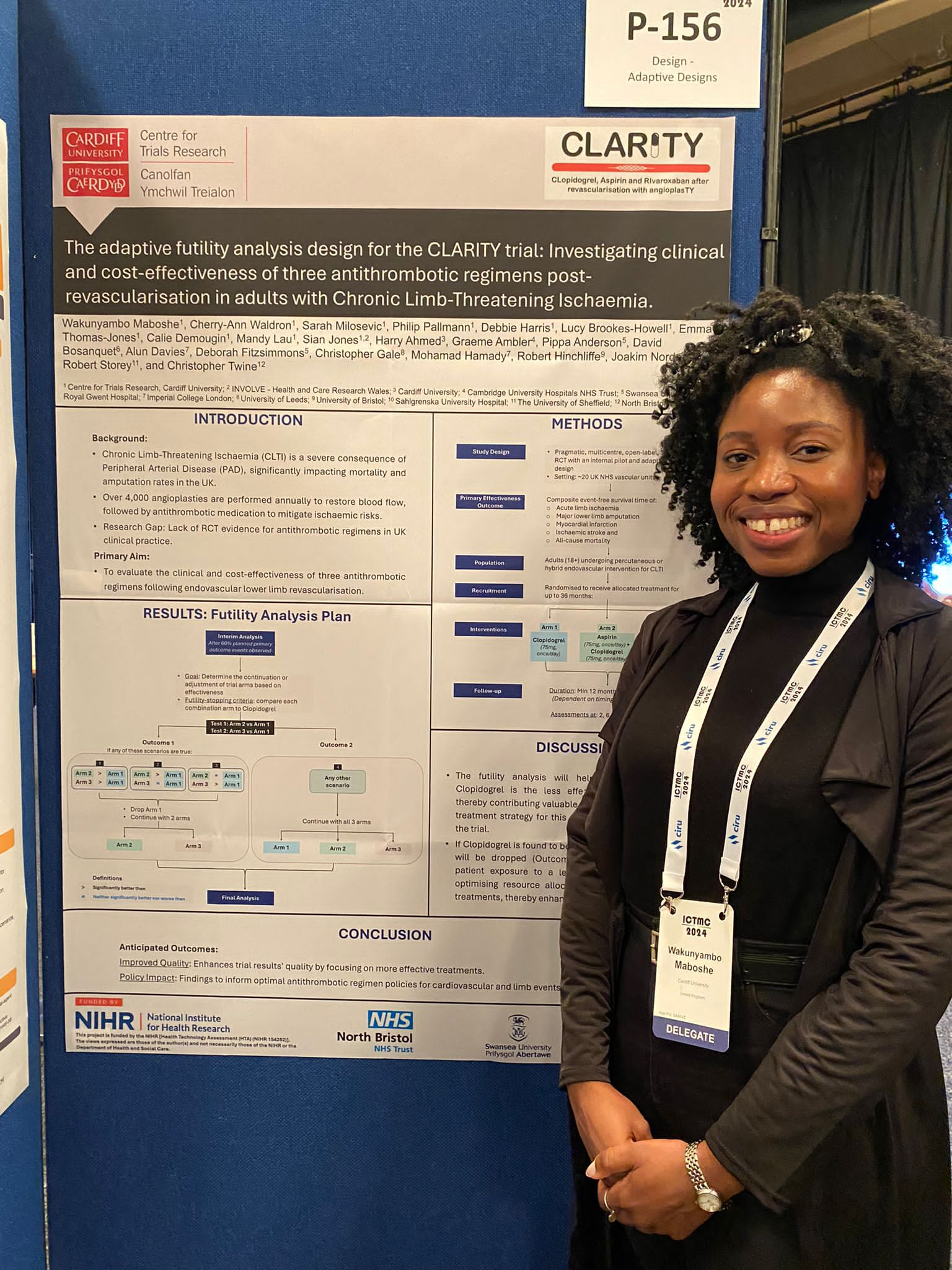
Waku Maboshe presented two posters on the CLARITY trial:
“Co-producing drug selection and adaptive design for the CLARITY trial: Investigating clinical and cost-effectiveness of three antithrombotic regimens post-revascularisation in adults with Chronic Limb-Threatening Ischemia”
“The adaptive futility analysis design for the CLARITY trial: Investigating clinical and cost-effectiveness of three antithrombotic regimens post-revascularisation in adults with Chronic Limb-Threatening Ischemia”
Vicky Shepherd presented two posters on her work around improving research involvement pathways for adults lacking capacity:
“I want the opportunity to be considered’: acceptability and feasibility of implementing advance research planning for trials involving adults lacking capacity to consent”
“Addressing the knowledge gap: improving inclusion of an under-served group through developing training on trials involving adults with impaired capacity to consent”
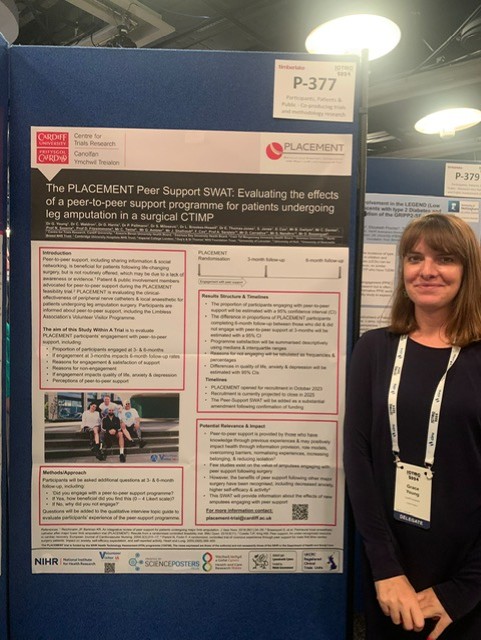
Grace Young presented two posters on SWATs within the PLACEMENT trial:
“The PLACEMENT Peer Support SWAT: Evaluating the effects of a peer-to-peer support programme for patients undergoing leg amputation in a surgical CTIMP”
“Perineural Local Anaesthetic Catheter After Major Lower Limb Amputation Trial (PLACEMENT) Follow-up SWAT: The effect of video information shown prior to discharge on follow-up completion”
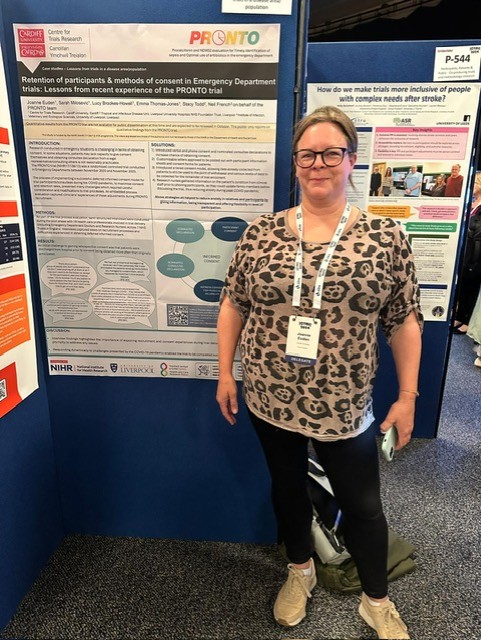
Jo Euden presented her poster titled “Retention of participants & methods of consent in Emergency Department trials: Lessons from recent experience of the PRONTO trial”. Jo’s poster focused on the qualitative process evaluation findings from the PRONTO trial.
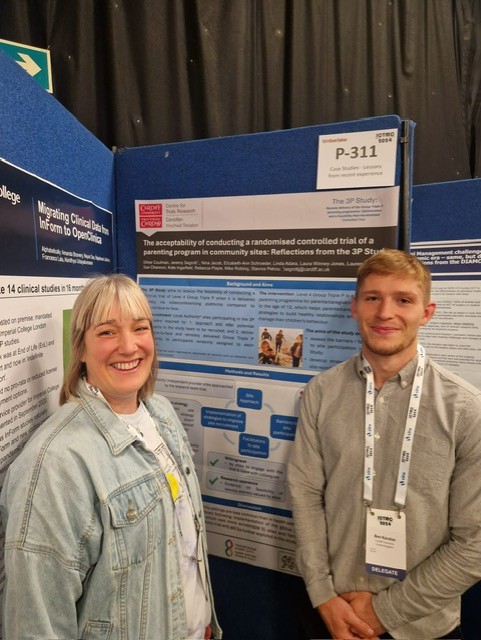
Nina Jacob and Ben Karatas presented on the 3P study titled: “The acceptability of conducting a randomised controlled trial of a parenting program in community sites: Reflections from the 3P Study”
Helen Stanton presented Sarah Nash’s work on the development of an easy-to-navigate participant database interface titled “The development of an accessible software platform to accelerate non-commercial trials for rapid patient impact (ASSISTANT)”.
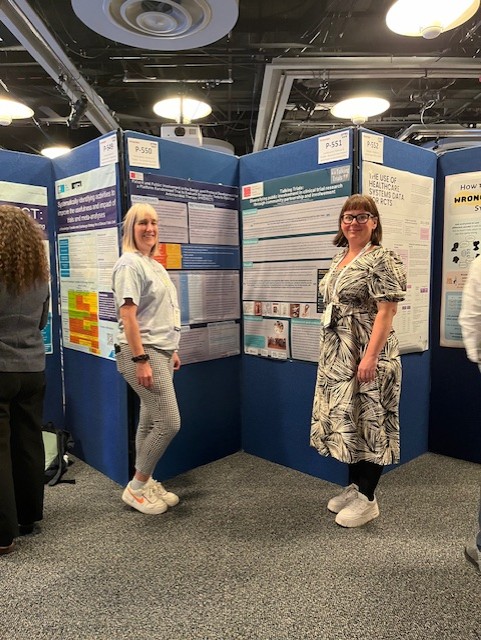
Martina Svobodova presented a poster on “Patient and Public Involvement in the Design and Protocol Development for a Platform Randomised Trial to Evaluate Diagnostic Tests to Optimise Antimicrobial Therapy (PROTECT)”.
Kat Hollands presented her experiences of collaborative working between the pharmacovigilance team and the trial team with her poster titled “Lessons from trials in a region – Experiences from the EWALL-PH-03 trial”.
Angela Casbard presented a poster on the “Application of a practical method for eliciting prior beliefs about cancer survival in a phase 3 randomised trial of radiotherapy for skin cancer patients”.
In collaboration with the UKCRC Data and IS Operations Group (DISOG), Nigel Kirby presented a poster titled “Empowering Data Managers – Creating Best Practice Guidelines”.
Final thoughts
Finally, reflecting on the ICTMC meeting, the conference showcased an abundance of creativity, featuring everything from a crocheted QR code to a performing arts presentation of mixed methods study results, and even a rap for a lightning talk. Such creativity in science communication makes research accessible, relatable, and memorable. Looking ahead to the 2026 Conference, we encourage everyone to participate and hope for even larger representation from the CTR. Engaging in these events not only allows us to share our work and insights but also to connect with peers and inspire meaningful dialogue within the research community. Could we do more than one workshop, six oral presentations, and sixteen posters? Challenge accepted!
Hopefully, see you in 2026 for another memorable conference!
- December 2025
- October 2025
- June 2025
- May 2025
- April 2025
- March 2025
- February 2025
- December 2024
- November 2024
- October 2024
- September 2024
- July 2024
- June 2024
- May 2024
- April 2024
- March 2024
- December 2023
- November 2023
- September 2023
- July 2023
- June 2023
- April 2023
- March 2023
- February 2023
- December 2022
- November 2022
- October 2022
- September 2022
- August 2022
- July 2022
- June 2022
- May 2022
- April 2022
- March 2022
- February 2022
- January 2022
- November 2021
- September 2021
- July 2021
- June 2021
- May 2021
- March 2021
- February 2021
- December 2020
- November 2020
- September 2020
- August 2020
- July 2020
- January 2020
- December 2019
- October 2019
- September 2019
- July 2019
- June 2019
- May 2019
- April 2019
- February 2019
- December 2018
- November 2018
- October 2018
- September 2018
- August 2018
- July 2018
- June 2018
- May 2018
- April 2018
- March 2018
- December 2017
- October 2017
- August 2017
- July 2017
- June 2017
- May 2017
- April 2017
- March 2017
- February 2017
- January 2017
- December 2016
- October 2016
- August 2016
- June 2016
- April 2016
- March 2016
- February 2016